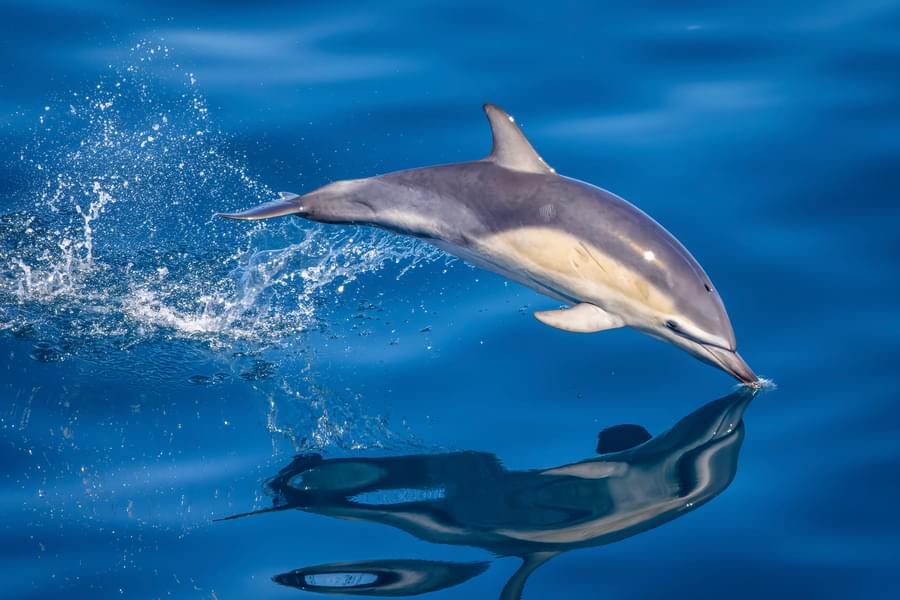What is World Wildlife Day?
World Wildlife Day marks the founding date of the CITES (the Convention on International Trade in Endangered Species of Wild Fauna and Flora), in 1973 and it is celebrated annually on the 3rd March. It is a day where we celebrate wildlife around the world. Each year, World Wildlife Day features a different theme to highlight various aspects of wildlife conservation and raise awareness about the challenges and opportunities in this field. This year, the theme is: connecting people and planet: exploring digital innovation in wildlife conservation. We are currently experiencing an era of rapid digital advancement, with technology revolutionising wildlife conservation and offering fascinating insights into animal behaviour like never before! Let’s explore this year’s theme and see how it relates specifically to ORCA’s work and then delve into some examples from the wider field of marine conservation.
.jpg?w=900&q=85&auto=format&fit=clip&dm=1683137454&s=d53868b65768033486a72bf4714e7a84)
Digital innovation in ORCA’s work
ORCA's mission is to give everyone who cares about whale and dolphin conservation an active role in safeguarding their future. We believe that science should be made accessible for everyone who is passionate about marine conservation, irrespective of their background, prior experiences or geographical location! To achieve this goal, we utilise the power of digital platforms and our specially designed OceanWatchers app. This allows citizen scientists to collect data on marine mammals and report their sightings to us, whether they’re on land or at sea, from anywhere in the world! This empowers our supporters to contribute to our vital data collection efforts and help conserve marine biodiversity, and also significantly expands our coverage for monitoring efforts. This provides valuable data which can help us to track population trends, identify key habitats, determine conservation priorities, and inform management decisions.
Our OceanWatchers app allows our amazing network of supporters from diverse backgrounds to contribute to marine mammal conservation, including rare and elusive species! This is a powerful conservation monitoring tool that helps us to inform policy and implement protective measures to help keep our seas alive with whales and dolphins for future generations. Our specialised training programmes for Marine Mammal Surveyors, Ocean Watchers and Ocean Conservationists are all delivered online. This allows us to recruit and train people remotely from all over the world to develop their skills and join us as citizen scientists!
ORCA also collaborates with researchers and industry partners to design and trial new technologies to better understand cetacean behaviour and help prevent collisions between ships and whales (ship strike). Ship strike is a complex issue and innovative solutions are needed to help combat this serious threat to cetaceans. ORCA are part of an ongoing project with a dedicated researcher on board a Brittany Ferries vessel in developing and testing a novel method to analyse whale behaviour in response to ships (read more about the project here). This research involves the use of a bespoke camera and logging system to record behavioural data of large whales. If we can better understand the behaviour of whales in response to ships, this could help us to develop future mitigation strategies to protect them from harm.

Future implications
The need to protect biodiversity is more urgent than ever, and the innovative use of technologies can provide essential data to help us understand and predict the impacts of threats such as climate change. There are great examples of technology worldwide that illustrate some of the remarkable advancements being utilised in wildlife conservation both at ORCA and in the wider field of wildlife conservation. Digital technology is poised to significantly impact the future of conservation research methodologies over the coming years (3). Continuing to understand animal behaviour can enable us to proactively address and mitigate harmful impacts on the extraordinary wildlife with whom we coexist on this planet. It is the collective responsibility of governments, the private sector, international organisations, non-governmental organisations, academic institutions, businesses, charities, donors and other relevant entities and individuals to address the digital divide in developing nations. We must ensure that everyone has equitable access to the benefits of the digital age, so that we can be united in protecting biodiversity and the natural world for future generations.
If you would like to support our work, why not join us on one of our training courses. We are about to launch a brand new e-learning platform where we will be hosting a wide variety of courses. Our new ‘Introduction to Whale and Dolphin Identification’ course will start learners on their ORCA journey. Then we have our ‘OceanWatchers’ course if learners would like to become a citizen scientist with ORCA; this course equips you with the skills needed to collect data using the OceanWatchers app. We’ve designed OceanWatchers to make data collection as flexible as possible, enabling you to be a key part of our conservation work. It gives everyone an opportunity to actively monitor important whale, dolphin and porpoise habitats, and continue to help create and maintain protected areas in UK, European and worldwide waters.
How can you help?
If you would like to support our work, why not join us on one of our training courses. We are about to launch a brand new e-learning platform where we will be hosting a wide variety of courses. Our new ‘Introduction to Whale and Dolphin Identification’ course will start learners on their ORCA journey. Then we have our ‘OceanWatchers’ course if learners would like to become a citizen scientist with ORCA; this course equips you with the skills needed to collect data using the OceanWatchers app. We’ve designed OceanWatchers to make data collection as flexible as possible, enabling you to be a key part of our conservation work. It gives everyone an opportunity to actively monitor important whale, dolphin and porpoise habitats, and continue to help create and maintain protected areas in UK, European and worldwide waters.

